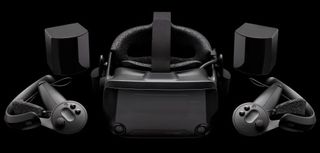Sony's reportedly stopped making any more PS VR2 headsets until it can figure out a way of shifting a pile of unsold VR goggles
Hmm, that explains why it's eyeing up PC support, too.

Sony's virtual reality headset for the PlayStation 5, the PlayStation VR2, is a lovely device but it has a few drawbacks. It only works on that system, there's not a huge amount of great VR games to play on it, and it's as expensive as the base console. So with sales on the decline, Sony has put a temporary halt on production, to stop its warehouses from clogging up with unsold stock.
The report by Bloomberg making this claim, cites shipments figures from IDC as the main evidence for this, along with the 'sources familiar with the plan.' While Sony might not directly come out and say that this is what it's doing, the number of PSVR2 units shipped per quarter pale in comparison to the number shifted by Meta. It's current darling, the Quest 3, is equally pricey, but the Quest 2 is half the price of the PSVR2 and is an excellent budget VR headset.
But, for me, the key bit of information behind the report is the fact that Sony has already stated that it's looking at offering PC support for the PSVR2. The tech giant has been extra keen on the humble PC of late, with a raft of games being ported across and there are plenty more to come.
Hopefully Sony is working with Valve in getting the PSVR2 to work properly with all VR content on that platform, but given that it's taken a good while for Dualsense controller support to be fully realised on the PC, it may be some time before it's all peachy. But that's fine, as all Sony really needs to do is just get the ball, and then the modding crowd will naturally take over to solve all the bugs.
The important question to ask at this point is whether Sony's headset is worth buying instead of Meta's. At the moment, the PlayStation VR2 is $549 on Amazon, whereas the Quest 3 is $499. Not only is the latter cheaper, it's also completely wireless and if you have a great Wi-Fi 6E router, then you can easily enjoy your Steam VR games with little in the way of lag.

However, the PSVR2 requires a cable, and the headset itself is bulkier than the Meta Quest 3. Its saving grace are the hand controllers, as they're replete with haptic feedback and adaptive triggers, and feel a lot comfier than those bundled with the Meta Quest 3.

Best VR headset: which kit should you choose?
Best graphics card: you need serious GPU power for VR
Best gaming laptop: don't get tied to your desktop in VR
Given that VR gaming on PC is a relatively niche thing, it's going to be down to what your personal preferences are, with regard to which headset is worth buying. I'd personally get the Quest 3, as tethered VR experiences aren't anywhere near as enjoyable as fully wireless ones, even though I really like Sony's controllers.
The biggest gaming news, reviews and hardware deals
Keep up to date with the most important stories and the best deals, as picked by the PC Gamer team.
When the PC support for the PlayStation VR2 headset eventually comes, we'll be sure to let you know how well all your favourite PC VR games work on it. But until then, just be certain about one thing: Don't count on Sony dropping the PSVR2's price at all to shift the inventory backlog.
As long as enough PC gamers buy the headset to increase the shipments by, say, a few hundred thousand, the bean counters won't be too worried about all those pretty white boxes stacked high, like the closing scene in Raiders of the Lost Ark.

Nick, gaming, and computers all first met in 1981, with the love affair starting on a Sinclair ZX81 in kit form and a book on ZX Basic. He ended up becoming a physics and IT teacher, but by the late 1990s decided it was time to cut his teeth writing for a long defunct UK tech site. He went on to do the same at Madonion, helping to write the help files for 3DMark and PCMark. After a short stint working at Beyond3D.com, Nick joined Futuremark (MadOnion rebranded) full-time, as editor-in-chief for its gaming and hardware section, YouGamers. After the site shutdown, he became an engineering and computing lecturer for many years, but missed the writing bug. Cue four years at TechSpot.com and over 100 long articles on anything and everything. He freely admits to being far too obsessed with GPUs and open world grindy RPGs, but who isn't these days?
Most Popular






